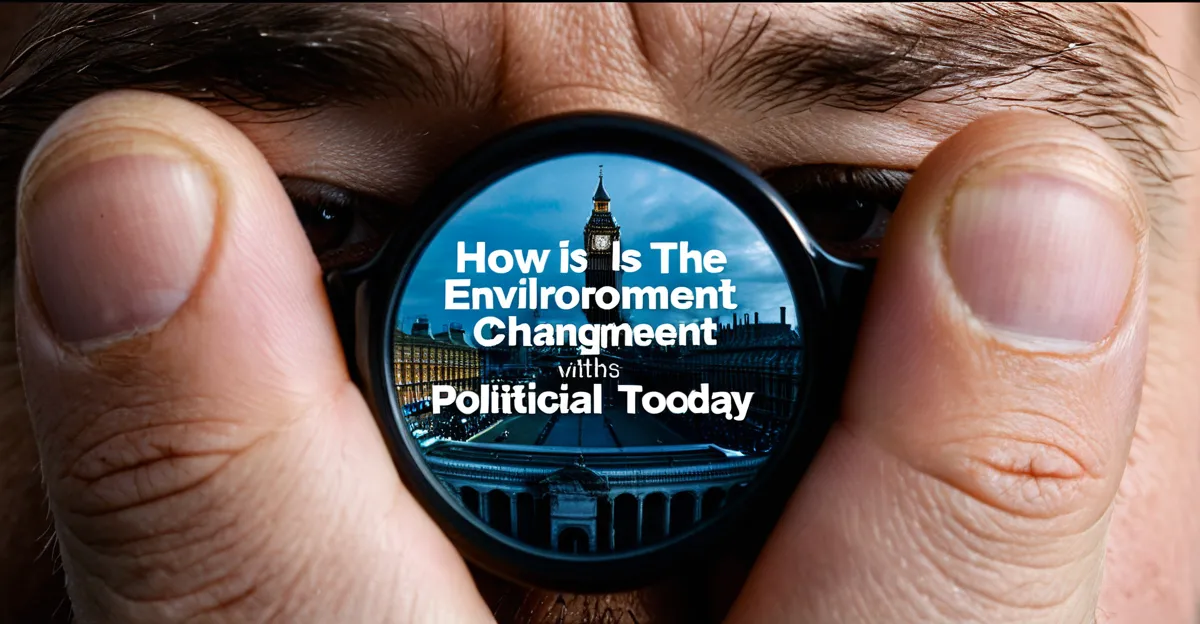Overview of the UK’s Current Political Landscape
Understanding UK politics today requires examining the dynamic shifts in the current political climate influenced heavily by recent events in 2024. Public opinion has noticeably swung in response to economic pressures, debates around social welfare, and ongoing discussions about the UK’s place within the global community after Brexit.
A key driver in this political atmosphere is the impact of notable 2024 political events. For example, unexpected leadership challenges within major parties and policy announcements concerning national security have captured public attention and shifted voter sentiment. These occurrences have reshaped the narrative surrounding trust and competency in government, influencing both policy debates and electoral momentum.
This might interest you : How Can Recent Events in the UK Impact Their Global Standing?
Within this evolving landscape, party standings reveal fluctuating fortunes. The Conservative Party, Labour Party, Liberal Democrats, and the Scottish National Party (SNP) each wrestle with internal and external pressures. Trends suggest that while Conservatives strive to consolidate their base, Labour is capitalizing on discontent with austerity and public service funding. Simultaneously, the SNP’s push for Scottish independence injects further complexity into the UK’s unity discussions.
These elements combined give a comprehensive view of the current political climate. They highlight a UK political scene marked by volatility, public engagement, and the interplay of historical and emergent priorities shaping both strategy and governance.
Topic to read : How Can Recent UK Policy Changes Impact Everyday Citizens?
Key Political Parties and Leadership
The UK political parties remain central to shaping the nation’s governance amidst the turbulent current political climate. The Conservative Party, Labour Party, Liberal Democrats, and the Scottish National Party (SNP) continue to play influential roles, each adapting strategically to recent shifts in voter sentiment and recent political events.
Leadership within these parties is pivotal. The Conservative Party’s leader has focused on consolidating support among traditional voters, navigating challenges tied to economic management. Labour’s leader, meanwhile, has emphasized social welfare and public service improvements, resonating with a base critical of austerity policies. The Liberal Democrats are positioning themselves as a centrist option, advocating pragmatic solutions on social policy. The SNP leadership remains committed to advancing Scottish independence, intensifying debates about the UK’s future union.
Changing leadership and strategic recalibrations have directly influenced party narratives and electoral strategies. For example, recent leadership contests within major parties have not only affected public trust but also shifted policy emphases, reflecting the dynamic nature of UK politics today. These changes underscore how leadership plays a critical role in steering parties through a volatile political landscape, responding to both internal pressures and external challenges.
In summary, the interplay between party leaders and their evolving strategies remains a defining feature of the current political climate, reflecting broader political trends and voter expectations. Understanding these parties’ positions and leadership approaches is essential to grasp the direction UK politics may take going forward.
Emerging Issues and Policy Shifts
The Brexit aftermath continues to deeply influence the current political climate, affecting both domestic policies and foreign relations. In 2024, adjustments to trade agreements and regulatory frameworks remain central, as lawmakers respond to challenges such as supply chain disruptions and evolving economic partnerships. This ongoing recalibration highlights how Brexit’s impact transcends initial departure, reshaping policymaking priorities.
Simultaneously, debates around devolution in the UK have grown more prominent. Scotland, Wales, and Northern Ireland are increasingly assertive in their calls for expanded powers, reflecting new political currents. In Scotland, the SNP’s renewed push for independence fuels discussions about the UK’s constitutional structure. Wales and Northern Ireland have also been active in negotiating greater autonomy, which complicates the unity narrative within the UK political landscape.
Recent social policy changes further illustrate the evolving priorities in governance. There has been a marked shift toward addressing welfare reform, healthcare funding, and affordable housing, influenced by public demands for improved living standards. Policy proposals aim to balance fiscal responsibility with social support, responding to economic pressures intensified by post-Brexit realities and 2024’s economic environment.
Together, these emerging issues reveal a political agenda in flux, shaped decisively by Brexit’s consequences, regional aspirations, and evolving social policy demands. Understanding this complex mix is crucial to grasping the full scope of UK politics today and the challenges that lie ahead.
Public Opinion and Voter Behaviour
Understanding UK voter trends in 2024 is essential to grasping the current political climate. Recent polling data reveals a public increasingly concerned with economic stability, healthcare, and social welfare. These issues dominate voter priorities, reflecting broader anxieties fueled by economic pressures and ongoing social policy debates. Public opinion on politics shows a growing demand for effective governance and transparent communication from party leaders.
Changing demographics play a pivotal role in shaping election outcomes. Younger voters tend to favor progressive policies, particularly around climate action and social justice, while older demographics show stronger support for traditional economic conservatism. This demographic divide influences party strategies as they attempt to broaden their appeal. For example, Labour’s emphasis on social welfare aligns closely with younger voters’ concerns, whereas the Conservative Party targets older voters prioritizing economic experience.
Key issues driving voter alignment and turnout include the Brexit aftermath, healthcare access, and national security. Voters are more likely to engage when parties address these topics with clear, actionable policies. For instance, the SNP’s focus on independence mobilizes Scottish voters, affecting turnout significantly in that region. Moreover, election polling data consistently highlights fluctuating support for parties as public priorities shift in response to recent political events.
In summary, the interplay between public opinion on politics and UK voter trends demonstrates how evolving concerns and demographic changes shape electoral behaviour. Parties must continuously adapt to these dynamics to secure voter confidence and influence the trajectory of UK politics today.
Expert Analysis and Predicting the Future
Expert political analysis UK consistently points to a deeply fluid current political climate, driven by both short-term pressures and longer-term structural changes. Analysts emphasize that understanding UK politics today requires attention to how parties respond to evolving voter concerns, evolving leadership, and external factors such as economic shifts and international relations.
What are the predominant future political trends in the UK? Current forecasts highlight increased volatility and the likelihood of continued realignment across the main parties. For example, political experts project that Labour’s emphasis on social welfare and public services could gain traction if economic conditions remain challenging. Meanwhile, the Conservative Party’s ability to retain its base may hinge on navigating policy successes in economic management and addressing regional disparities.
How might leadership developments shape the political landscape ahead? Changes in party leaders and their strategic approaches remain critical. Analysts note that emerging leadership figures with strong communication skills and clear policy visions often drive shifts in public support and party fortunes. The interplay between established leaders and new challengers creates a contested environment where adaptability is key.
Scenario analysis for upcoming elections underscores uncertain but competitive outcomes. Predictions suggest that regional dynamics, especially SNP advances in Scotland coupled with devolution debates in Wales and Northern Ireland, will significantly influence national election results. Furthermore, ongoing economic and social policy changes—such as responses to the Brexit aftermath—will factor heavily into voter decisions.
In summary, political analysis UK encompasses a multifaceted view that combines short-term event impacts with long-term political and social evolutions. The interplay of leadership changes, party strategies, and public sentiment forecasts a politically active future where adaptability and responsiveness will define party success in the complex current political climate.




